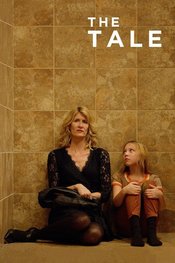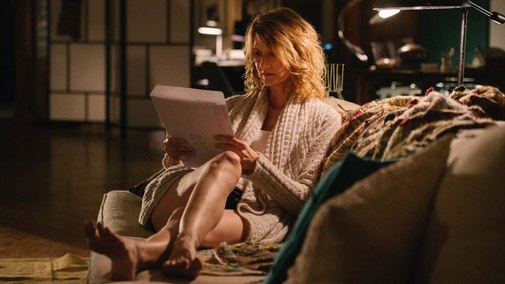By Spencer Coile
 I intended for this to be a formal review of Jennifer Fox’s autobiographical HBO film, The Tale. I was going to dive into the Sundance darling and discuss it, celebrate it, and critique it the way we do most movies. I was going to conclude with the film’s Emmy chances, where it will no doubt be a worthy contender for Best Made for TV Movie and Laura Dern in Leading Actress. And it’s no wonder – it was critically lauded as a timely reflection of the #MeToo movement.
I intended for this to be a formal review of Jennifer Fox’s autobiographical HBO film, The Tale. I was going to dive into the Sundance darling and discuss it, celebrate it, and critique it the way we do most movies. I was going to conclude with the film’s Emmy chances, where it will no doubt be a worthy contender for Best Made for TV Movie and Laura Dern in Leading Actress. And it’s no wonder – it was critically lauded as a timely reflection of the #MeToo movement.
But a "review" would be doing Fox’s story a disservice. This is, first and foremost, a personal story about Fox's reconciliation with the past as a means of understanding her present and future. The Tale was acclaimed coming out of Sundance, and was quickly scooped up by HBO. Gone were Dern’s Oscar chances, but this decision ensured that the film would reach an audience, which according to Fox, was the point all along.
Dern plays Jennifer Fox at 48-years-old – a documentarian, a professor, engaged. On the surface, she seems to be living a completely fulfilling life. But when her mother (Ellen Burstyn) finds a story that Jennifer wrote at 13, her world begins to crumble...
The personal narrative she wrote, titled “The Tale,” depicts Fox as an adolescent; she is charmed by her horse riding instructor, Mrs. G. (Elizabeth Debicki) and her track coach and personal friend, Bill (Jason Ritter). What ensues is a close relationship between the three, and years after the fact, Jennifer must reevaluate what she endured at such a young age.
The Tale is Fox’s first feature as a screenwriter and director of a scripted film, but there is something quite assured in her filmmaking – a quality that makes her story both deeply personal yet relatable and worthy of conversation. Rather than recounting her experiences through flashbacks, the narrative here all blends together; Fox as an adult shares scenes with Fox as a chlid. And, being a documentarian, Fox often positions herself as such in the film -- certain scenes depict her adult self (off-screen) interviewing Mrs. G. and Bill.
She also plays with time in ways that make her story feel unreliable. She initially begins by depicting herself as looking about 15-years-old. But after seeing a photo of herself from that year in her life, she adjusts the narrative again -- going back in time and re-playing scenes we had already seen with a much younger looking version of herself. It's a bold move, to make us uncomfortable at the age gap between Fox and her attackers, but one that serves the tone and story well. It is grueling and hard to watch (I had to take a break while watching it), but a powerful cinematic flourish that paints Fox's past as incomplete.
That is not to say, of course, that Fox is an unreliable narrator. Rather, it is her way (as a filmmaker and as a character) of trying to make sense of memory. She knows that she experienced abuse at the hands of Mrs. G. and Bill, but the details are lost -- she is clamoring to find them, to retain them, to remember them. What actually happened?
The Tale does not conclude with a tidy bow at the end as the credits begin to roll. If Fox does not have all the answers, then why should we? What we are left with is a feeling of doubt, betrayal, and anger. I found myself quitely crying as the film ended, and I wasn't exactly sure why. There is nothing explosive that happens in The Tale, as its menace bubbles beneath the surface for the most part.
Perhaps I was mortified that Fox may never get the closure she wants. Perhaps I was merely disgusted at what she went through. Or perhaps I was as confused as she was -- trying so desperately to find answers that may never come to be. Maybe The Tale was Fox's way of coming to terms with truth, however elusive it remains.

